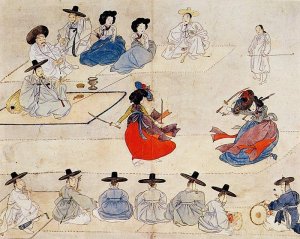Capital Scandal was an unexpected delight. Part jazzy, Technicolor rom-com, part serious look at the physical and emotional toll of occupation, it gracefully balances humor and heartbreak. A romance, especially a funny one, set during the Japanese colonial era sounds like a recipe for disaster, but the show does a remarkable job of finding lighter moments without ever glossing over the atrocities of the age.
Visually and aurally, the show evokes vintage Hollywood, complete with swing tunes, flashing neon, and heightened acting that occasionally slips a bit too far towards the cartoonish. The Japanese characters are mostly broadly drawn, grating caricatures, more inane than sinister. The real conflicts in the show are between the Koreans, as they weigh the options of collaboration or resistance, betrayal or heroism, survival or sacrifice. To its credit, the show makes these struggles complicated, rarely drawing clear cut lines between “good” and “bad” as it examines the varied ways people endure a time of terror. While some plot elements require significant suspension of disbelief, particularly a final episode more grounded in wish fulfillment than reality, the show isn’t afraid to venture into darker territory, both psychologically and dramatically. It also features strong female characters who equal and often exceed the men in smarts, courage and conviction.
Most shows choose primary colors or shades of grey. Capital Scandal celebrates both, letting its surface flair complement rather than overwhelm its deeper themes. It thrives on contradiction, throwing its moments of joy into stark relief against a background of injustice, pain, and loss.
Cet avis était-il utile?

























